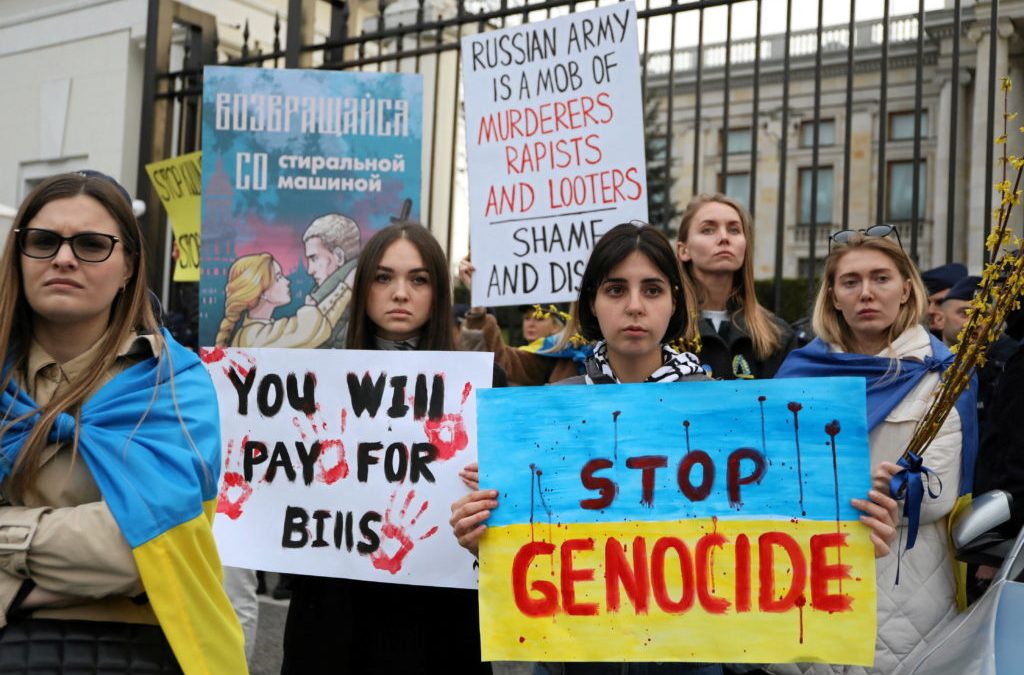-
Best Australian Pokies Best Payout
Play Free 777 Pokies Online
What Are the Best Australian Pokies to Win Big On
What Are the Best Online Pokies with Low Minimum Deposits for Real Money in Australia
New Australian Pokies Accepting PayID
What Are the Best Strategies to Win in Online Pokies with Bonus Rounds in Australia
Tips for Winning Top Australian Pokies
What Online Casinos Offer Free Play Pokies with Welcome Bonuses in Australia
Australian Slot Games
Payout Ratio Pokies with Welcome Bonus

People hold banners during an anti-Russian demonstration outside the Russian embassy, amid Russia's invasion of Ukraine, in Warsaw, Poland, April 13, 2022. Maciek Jazwiecki/Agencja Wyborcza.pl via REUTERS ATTENTION EDITORS - THIS IMAGE WAS PROVIDED BY A THIRD PARTY. POLAND OUT. NO COMMERCIAL OR EDITORIAL SALES IN POLAND.
Has Russia committed genocide? Did something in the article suprise you? Discuss.
Has Russia committed genocide?
1. Has Russia committed genocide? Explain.
2. Did something in the article suprise you? Discuss.
3. Pick a word/line/passage from the article and respond to it.
4. Discuss a “move” made by the write in this piece that you think is good/interesting. Explain.
What is genocide?
Genocide is widely seen as the most serious crime against humanity.
It is defined as a mass extermination of a particular group of people – for example, the murder of six million Jews in the Holocaust of World War Two.
The UN Genocide Convention defines genocide as committing any of the following “with the intent to destroy, in whole or in part, a national, ethnic, racial or religious group”:
- Killing members of the group
- Causing serious bodily or mental harm to members of the group
- Deliberately inflicting on the group conditions of life calculated to bring about its physical destruction in whole or in part
- Imposing measures intended to prevent births within the group
- Forcibly transferring children of the group to another group
Has Russia committed genocide in Ukraine?
There is no consensus on this.
Eugene Finkel, an associate professor of international affairs at Johns Hopkins University, believes genocide is underway in Ukraine. He says there is evidence of killings, carried out in Bucha and other places, of people based on their Ukrainian identity.
“It’s not just killing people, it’s targeting a national identity group,” he says.
However, it’s the rhetoric coming from Moscow that tips over into genocidal intent, Mr Finkel says.
He points to an article titled “What should Russia do with Ukraine?” published last week by Russia’s state-owned media Ria news agency.
The article argues that Ukraine “is impossible as a nation state” and even its name “apparently cannot be retained”; the Ukrainian nationalist elite “need to be liquidated, its re-education is impossible”, argues the article’s writer, Timofei Sergeytsev.
He bases his theory on the baseless claim that Ukraine is a Nazi state, arguing that a significant section of the population is guilty too because they are “passive Nazis”, and therefore accomplices. After a Russian victory these people would require re-education lasting at least a generation and it would “inevitably mean de-Ukrainisation”.
“For me, the shift in tone in recent weeks in Russia, and especially among the elites, was the tipping point that we call the threshold of intent, not just to destroy the state… but to destroy an identity,” says Prof Finkel.
“The goal of the war is de-Ukrainisation… they are not focusing on the state, they’re focusing on Ukrainians.”
Gregory Stanton, founding president and chair of Genocide Watch, says there is proof “that the Russian army is in fact intending to destroy, in part, the Ukrainian national group”.
“That’s why they’re targeting civilians. They’re not just targeting combatants and military.”
He says President Putin’s claims in the lead-up to the invasion, that the eight-year war in Ukraine’s east looked like genocide, were what some scholars call “mirroring”.
“Often the perpetrator of genocide will accuse the other side – the targeted victims – of intending to commit genocide before, in fact, the perpetrator does so. That’s what happened in this case.”
‘Evidence not strong enough yet’
But other experts in the field of genocide say it’s too early to define Russian atrocities as being in that category.
According to Jonathan Leader Maynard, lecturer in international politics at King’s College London, says the evidence is still too unclear under the strict wording of the Genocide Convention.
That doesn’t necessarily mean genocide is not taking place – he says it’s “very clear” that atrocities are happening – just that the bar has yet to be cleared.
“It’s possible that those atrocities could be genocidal or could escalate in future to genocide, but the evidence is not strong enough yet,” he says.
However, he points to the “deeply troubling” rhetoric of Russia’s president denying Ukraine’s historical existence as an independent nation. It illustrates a “genocidal way of thinking”, he says, where Vladimir Putin believes Ukraine “isn’t real, so they don’t have the right to exist”.
Attachments
